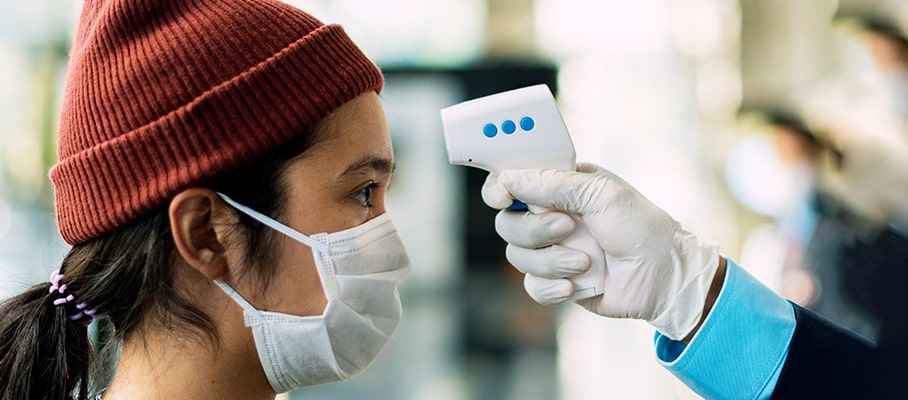Health Wellness
Are you immune to COVID-19 if you get it once?
7691 Views
0

What the whole world is desperately waiting for in the current times is to get the COVID-19 vaccine. How will a vaccine against the coronavirus help us save from the pandemic? So, the entire game is about getting immunity to COVID-19. Immunity provides protection against catching the infection. One question that has gained everyone’s attention is could you be immune to COVID-19 if you had been infected once? This holds a lot of importance as people who have once recovered from COVID-19 will be able to return back to work or travel freely, considering that they are safe. However, if they are not, it can lead to COVID-19 reinfection, further spread, and pose risk to people’s lives.
Have common cold-like symptoms that you think could be COVID-19? Get tested for coronavirus at home and be assured.
Antibodies and immunity to COVID-19
As soon as any virus attacks you, yourbody’s defense system naturally responds immediately. This helps slow the progress of the virus and may even prevent it from causing symptoms. This first response is followed by a more advanced, specific response where your body makes protective molecules, called antibodies that bind to the virus and inactivate it. These antibodies are specific for a particular type of infection, which means, if you have antibodies against poliovirus, your body gets immune to that virus. Similarly, if you have antibodies to COVID-19, you can become immune to the coronavirus.
When a person gets infected with COVID-19, his or her body makes protective antibodies specifically to fight COVID-19, which help in clearing the virus from the body and allow recovery from the infection. Please note that the amounts of antibodies formed and the level of immunity that they confer might differ from person to person, depending on various factors such as the individual body response, age, and overall health status.
The WHO continues to review the evidence on antibody responses to coronavirus infection. Most of these studies have shown that people who have recovered from infection have antibodies to the virus. Hence, it is very clear that the immunity to COVID-19 is linked to the presence of antibodies against COVID-19.
Do antibodies provide immunity to COVID-19?
As per the experts, antibodies can provide some level of temporary immunity to COVID-19. However, no study has evaluated whether the presence of antibodies confers immunity to reinfection by this virus. The main catch here is that researchers aren’t sure about how long these antibodies stay in the body, so you can’t really be sure about how long this immunity lasts! The extent and duration of this antibody immunity to COVID-19 remain unknown as yet. The best thing is to continue taking precautions even if you have already had COVID-19 once.
Can you get tested for immunity to COVID-19?
Actually, no! As yet, no test can confirm that you are immune to COVID-19. However, a COVID-19 antibody test can detect the COVID-19 antibodies if you had been infected previously and recovered from the disease. This test measures the presence of antibodies in your blood and can be quite useful to understand if your body has encountered the virus in the recent past. Many of the people with COVID-19 have been asymptomatic and do not show any symptoms. A COVID-19 antibody test can tell if you had contracted the virus and your body made antibodies to fight it.
Does a positive COVID-19 antibody test mean you are immune to COVID-19?
A positive antibody test or the presence of antibodies only means that you’ve been exposed in the past. Having a positive antibody test does not mean that you’re immune to the virus. Researchers have explained that, for some infections, antibodies may provide protection against reinfection. For others, reinfection cannot be prevented, but symptoms may be milder. In yet other cases, antibodies can provide no protection at all. The coronavirus that causes COVID-19 is a new virus, and the scientists are still learning about it. There isn’t much clarity on how the antibodies to COVID-19 behave.
Also, a negative COVID-19 antibody test doesn’t mean that you had never contracted the virus. There might be a possibility that your antibodies levels have been exhausted, and hence the past infection could not be detected by the test.
Could you get COVID-19 twice?
It seems possible, however, how often is not known. There have been multiple cases reported in different parts of the world that people can be infected a second time. Though antibodies may prevent progression to severe illness or re-infection by the same virus, experts don't know how much protection, or how long it would last. It is also unclear if the reinfected people will be able to spread the infection to others.
What should you do to prevent COVID-19 infection/ reinfection?
The most effective ways to prevent catching coronavirus infection is to follow social distancing, wash hands often and use hand sanitizers, and wear a mask when in public. Even if you had contracted the virus in the past, do not take it as a COVID-19 immunity passport! That’s simply not advisable. Continue taking hygienic precautions against the virus to help protect yourself and your loved ones.













1701259759.webp)









 WhatsApp
WhatsApp